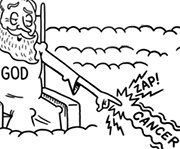|
Adventure Pigeon posted:. I've already provided a few examples of people getting hosed over without even being aware of it by informal company-to-company networks. . Anecdotes are not evidence
|
|
|
|

|
| # ? May 2, 2024 18:18 |
|
Mel Mudkiper posted:Anecdotes are not evidence Ok.
|
|
|
|
Adventure Pigeon posted:I work in the biological sciences, and I see the formal and the informal getting blurred all the time. The people you're on papers with, who you've worked under, who you've collaborated with, can all affect your chances of getting hired, getting grants, and keeping your job.In my own case, I was rejected from a fellowship because one of the minor people on the grant application had a grudge between him and someone on the grant committee. I found out about a year after the fact. I've heard and seen plenty of other stories about how those informal relationships can gently caress people who don't deserve it over. Maybe it comes from being in a more unpleasant field, but I take a dimmer view on those bar conversations. You should at least maybe stop and realize that the problem here isn't actually the informal gossip so much as it is the unethical behavior of the people involved, coupled with some larger economic and social issues which work together to make this an actual problem. Here's the thing: if someone is bad at their job, then they probably shouldn't be working that job or a similar job, especially if we're talking about anything above an entry level position. Employers communicating this information is a good thing because it helps people get into roles where they can contribute meaningfully. If people are communicating misinformation because of personal grudges then that's a problem, and it's totally separate from people being able to talk to each other. Likewise, it's a problem that someone losing their job is such a potentially life altering event. That's also a separate issue.
|
|
|
|
Paradoxish posted:You should at least maybe stop and realize that the problem here isn't actually the informal gossip so much as it is the unethical behavior of the people involved, coupled with some larger economic and social issues which work together to make this an actual problem. No, I fully realize that's the problem. Hence why I said in my earlier statement "if it prevents someone from being hired". I don't mean we should ban talking about work in bars. I mean bar "relationships" shouldn't be the basis for choosing whether someone is hired or not.
|
|
|
|
Adventure Pigeon posted:I'm not sure you meant to say it this way. I'm assuming you mean that's not sufficient to say something should be done. On the other hand, because everything is open to abuse doesn't mean that some things aren't worse than others. I've already provided a few examples of people getting hosed over without even being aware of it by informal company-to-company networks. I'm not sure what else I can provide. If your position is "everything is bad so do nothing", we can stop right here. Yes, I meant 'should be done'. My point is that simply saying 'this is open to abuse' isn't an argument. You have to argue 'the potential for abuse outweighs the potential for good and the problems in stopping it'. Since you've said that this isn't actually possible to do anything about, it kind of sounds like you're saying 'This can be abused, but there's nothing we can do about it", which is you saying 'do nothing', right? quote:If a person was an absolutely lovely employee, they'd have plenty of people to disagree with. If it was fictional, they could speak with HR. In the end, in your case, the person was hired anyways and then fired for being, surprisingly, a lovely employee. Sometimes letting things go is preferable to being a vigilante, and it works out anyways. No, sometimes employees only have one or two other people they work with, or just have one boss they work for. If it was fictional, how would HR help? If the anonymous report from another employee was 'this guy was a fuckup' all HR could do would be say 'we have no record of him being a fuckup' at best. Vigilante has an actual meaning, like 'blacklist', and it's inappropriate to use it here. quote:Yes, if it prevents someone from being hired. We're not going to agree on that, so lets drop it here. Wow, you actually think that people shouldn't even be allowed to complain about people when blowing off steam. You're right that we're not going to agree on that. Adventure Pigeon posted:No, I fully realize that's the problem. Hence why I said in my earlier statement "if it prevents someone from being hired". I don't mean we should ban talking about work in bars. I mean bar "relationships" shouldn't be the basis for choosing whether someone is hired or not. You have no way of knowing if that conversation will prevent someone from getting hired, and someone can't simply forget that they heard someone was a big ol' fuckup. quote:I work in the biological sciences, and I see the formal and the informal getting blurred all the time. The people you're on papers with, who you've worked under, who you've collaborated with, can all affect your chances of getting hired, getting grants, and keeping your job.In my own case, I was rejected from a fellowship because one of the minor people on the grant application had a grudge between him and someone on the grant committee. I found out about a year after the fact. I've heard and seen plenty of other stories about how those informal relationships can gently caress people who don't deserve it over. Maybe it comes from being in a more unpleasant field, but I take a dimmer view on those bar conversations. Edit: Removed info so it doesn't further gently caress someone who already got hosed. To me, what you are ignoring is the failure of 'official channels', that a person can be blackballed (which is what the phrase is when it's on an individual level) solely through the set of relationships you mention, and that your position is that the person blackballed shouldn't be able to complain about being blackballed to other people. I fail to see how a bar conversation at all intersects with the above. Who you work with, who you've collaborated with, all of that is still going to function if nobody ever talks poo poo in bars. The above situation happened solely inside the formal settings of the program. Instead of fretting about the informal networks--which are not eradicable, which are a natural part of human association, and which also serve positive functions as well as the negative ones you fixate on--why not concentrate on the fact that the formal processes at most institutions are mostly massively hosed up and politicized, with the institution almost always working to defend the much more valuable PI than the employee? Obdicut fucked around with this message at 00:53 on Jul 11, 2015 |
|
|
|
Obdicut posted:Yes, I meant 'should be done'. My point is that simply saying 'this is open to abuse' isn't an argument. You have to argue 'the potential for abuse outweighs the potential for good and the problems in stopping it'. Since you've said that this isn't actually possible to do anything about, it kind of sounds like you're saying 'This can be abused, but there's nothing we can do about it", which is you saying 'do nothing', right? Pretty much. I don't like the situation. I'll argue against it. If someone who understands the field said they were going to come up with a set of regulations to improve transparency in the hiring process and maybe improve regulation against blacklisting, I would support it, but if you said come up with something on your own, I'd admit I don't know enough about the field to be confident that whatever I came up with would protect people or fix things. quote:Wow, you actually think that people shouldn't even be allowed to complain about people when blowing off steam. You're right that we're not going to agree on that. You have a bad habit of misreading what people say so you can argue against it. As Paradoxish just said, it's not the conversation, it's how people behave with it. quote:Edit: Removed info so it doesn't further gently caress someone who already got hosed. Official channels can fail and academia is especially hosed up with regards to recourse. Your friend's story is very common. I could name four people with similar experiences, one of whom was kicked out of a program part way through a PhD, one at the end of it, but it's separate from what we've been talking about. quote:I fail to see how a bar conversation at all intersects with the above. Who you work with, who you've collaborated with, all of that is still going to function if nobody ever talks poo poo in bars. The above situation happened solely inside the formal settings of the program. Instead of fretting about the informal networks--which are not eradicable, which are a natural part of human association, and which also serve positive functions as well as the negative ones you fixate on--why not concentrate on the fact that the formal processes at most institutions are mostly massively hosed up and politicized, with the institution almost always working to defend the much more valuable PI than the employee? The formal processes are a separate issue and a separate conversation. If you've failed to understand why fields with a lot of competitiveness and hostility might use informal relationships to gently caress each other's job prospects over, well, I dunno what to tell you. Adventure Pigeon fucked around with this message at 01:21 on Jul 11, 2015 |
|
|
|
Adventure Pigeon posted:Pretty much. I don't like the situation. I'll argue against it. If someone who understands the field said they were going to come up with a set of regulations to improve transparency in the hiring process and maybe improve regulation against blacklisting, I would support it, but if you said come up with something on your own, I'd admit I don't know enough about the field to be confident that whatever I came up with would protect people or fix things. Again, transparency comes with its own problems, and something can be totally transparent and still lead to someone being blackballed. We have not, at any point, actually been talking about blacklisting. quote:You have a bad habit of misreading what people say so you can argue against it. As Paradoxish just said, it's not the conversation, it's how people behave with it. It isn't my fault that what you're saying is not, actually, realistic. You said you're against those bar conversations if they lead to someone not getting hired. If I complain about someone being shittastic, the person I'm complaining too, if they're in a hiring situation, can't pretend they don't know that information. Also, you said that you "take a dimmer view on those bar conversations". quote:Official channels can fail and academia is especially hosed up with regards to recourse. Your friend's story is very common. I could name four people with similar experiences, one of whom was kicked out of a program part way through a PhD, one at the end of it, but it's separate from what we've been talking about Except that your proposed best-case scenario is to have everything be formalized. My point is that formalization is not in any way a protection against abuse. In fact, I would argue that formalization actually benefits the powerful and established more. quote:If you've failed to understand why fields with a lot of competitiveness and hostility might use informal relationships to gently caress each other's job prospects over, well, I dunno what to tell you. I haven't, though. At most, I've pointed out that this is not something you can actually address in any way without also getting rid of the way that people use informal relationships to help each other out or to avoid being hosed over. For example, informal conversations are often what warn people "Don't join that guys lab, he steals his students research/doesn't actually understand CRISPR/acts like a poo poo to female grad students". Obdicut fucked around with this message at 01:27 on Jul 11, 2015 |
|
|
|
Obdicut posted:Again, transparency comes with its own problems, and something can be totally transparent and still lead to someone being blackballed. We have not, at any point, actually been talking about blacklisting. This has gotten pretty far off track and kind of absurd. I think the thread was doomed the second it budded off the gamergate mess. I agree, transparency comes with its own problems, and needs means of recourse to be meaningful. We have been talking about blacklisting, but I think things keep coming back to your own case, which I agree wasn't blacklisting. Formalization is not protection against abuse, but that doesn't mean informal relationships benefit the powerful and established just as much. The stuff about barroom conversations is getting sort of silly. The real problem are informal relationships that result in things like the British blacklist of construction workers, or HR departments passing around blacklists consisting just of applicants. And yes, people outside of power can use informal relationships to protect each other just as much, and I've used them myself. I'm not really interested in those, but I wouldn't want any regulations that would prevent that. Mostly I think greater transparency and access to recourse would help prevent the major blacklisting incidents. It would also probably prevent some incidents where a person's name is dishonestly passed around. It would probably also prevent some people who're genuinely bad from being banned. I think it's more important that good people be hired than bad people not be hired. I have no idea what regulations would actually accomplish this, and I'm not sure any could since companies are happy to skirt the existing ones.
|
|
|
|
So are people really upset that people face social consequences for being racist in public? If so I hope they are spending more of their time fighting for employment and housing protections for lgbt people, which seems to be a more important issue in my opinion.
|
|
|
|
Blacklists are unnecessary. The future of recruiting for any "good job" is going to be based heavily on "cultural fit" and social networks. People that are far outside of cultural norms will be filtered out by these methods.
|
|
|
|
Sharkie posted:So are people really upset that people face social consequences for being racist in public? If so I hope they are spending more of their time fighting for employment and housing protections for lgbt people, which seems to be a more important issue in my opinion. The fact that someone engages in philosophical masturbation online does not necessarily mean they hold the given topic to be so important as to fight for it at all. On a pragmatic level I don't really give a poo poo about racists developing a reputation that makes it harder for them to get hired, because it's likely they're going to eventually find some kind of work and eke out a living, but I'll admit that I've sometimes felt a bit disdainful of people who whine about how undesirables (like racists, or sex offenders) just shouldn't be hired; okay, so if you're opposed to anyone hiring them, what should society do with/about them?
|
|
|
|
Farmer Crack-rear end posted:The fact that someone engages in philosophical masturbation online does not necessarily mean they hold the given topic to be so important as to fight for it at all. Edit: I don't know, though. Is there something our society should be doing to make sure people who think black people are animals, and gay people should be put in camps, aren't unduly oppressed by people not wanting to associate with them? Sharkie fucked around with this message at 07:59 on Jul 11, 2015 |
|
|
|
There are definitely cases where someone is being such a poo poo bag that other employers should be aware. It's functionally impossible to separate these from situations where there is employer abuse of power and complicated situations that don't have a clear right and wrong. Like the employee handbook says, if it even could appear unethical, don't loving do it.
|
|
|
|
In a society that makes the necessities of life dependent on having a job and an income, I can't support witch hunts to blacklist someone from all jobs and unperson them until they starve or whatever. Yeah, if someone says some racist poo poo at work okay fire them sure that's unacceptable behavior at work, or if they do something to publicly associate the company with racism, same deal. Putting scarlet letters on people to try to cut them off from any chance at future employment because of something they said once, nah.
|
|
|
on the left posted:Blacklists are unnecessary. The future of recruiting for any "good job" is going to be based heavily on "cultural fit" and social networks. People that are far outside of cultural norms will be filtered out by these methods. Oh, good, culture jamming will be able to create the conditions for revolution all on its own then.
|
|
|
|
|
Adventure Pigeon posted:This has gotten pretty far off track and kind of absurd. I think the thread was doomed the second it budded off the gamergate mess. I agree, transparency comes with its own problems, and needs means of recourse to be meaningful. We have been talking about blacklisting, but I think things keep coming back to your own case, which I agree wasn't blacklisting. We haven't been talking about blacklisting at any point. The OP isn't about blacklisting, and nothing you and I have talked about has been blacklisting. The network of informal relationships is not blacklisting, which is most of what we've talked about. quote:Formalization is not protection against abuse, but that doesn't mean informal relationships benefit the powerful and established just as much. The stuff about barroom conversations is getting sort of silly. The real problem are informal relationships that result in things like the British blacklist of construction workers, or HR departments passing around blacklists consisting just of applicants. Those are entirely different kinds of relationships, and when you have an actual database, it's obviously not 'informal' anymore. It's formalized. quote:And yes, people outside of power can use informal relationships to protect each other just as much, and I've used them myself. I'm not really interested in those, but I wouldn't want any regulations that would prevent that. You wouldn't want any regulations, right? That's the conclusion you've come to? quote:Mostly I think greater transparency and access to recourse would help prevent the major blacklisting incidents. It would also probably prevent some incidents where a person's name is dishonestly passed around. Please explain how. quote:It would probably also prevent some people who're genuinely bad from being banned. I think it's more important that good people be hired than bad people not be hired. I have no idea what regulations would actually accomplish this, and I'm not sure any could since companies are happy to skirt the existing ones. The two things are related, since good and bad people are applying for the same jobs. This is not like the justice system; if a job is available, either a 'good' or a 'bad' worker is going to get it (stipulating the vast majority of workers are 'good'). If you don't prevent a 'bad' worker from getting a job, then you have prevented the good worker from being hired for that job.
|
|
|
|
Blacklists are unnecessary. They are an authoritarian prevention of market entry. If a free actor is not fit for a job, the market will correct itself. Resumes are unnecessary. A free actor should be allowed to prove their worth and if they are not fit for a job, the market will correct itself. Talking to other people socially about anything related to private enterprise is unnecessary. A free actor should be allowed to prove their worth without social interaction. Also market transactions are supposed to be based on full knowledge of all options so that the best choice can be made by all free actors, knowledge you get through some means or another. oops i forgot that economic exchange is a social phenomenon, between human beings; looks like market libertarianism doesn't make sense and has a deep disconnect from the way human beings act Rodatose fucked around with this message at 15:10 on Jul 11, 2015 |
|
|
|
VitalSigns posted:In a society that makes the necessities of life dependent on having a job and an income, I can't support witch hunts to blacklist someone from all jobs and unperson them until they starve or whatever. Pretty much where I'm at regarding this. Locking someone out of the job market is effectively condemning that person to poverty, which seems wildly disproportionate for all but the most heinous of fuckups.
|
|
|
|
A big flaming stink posted:Pretty much where I'm at regarding this. Locking someone out of the job market is effectively condemning that person to poverty, which seems wildly disproportionate for all but the most heinous of fuckups. It would be terrible if there were any evidence it was happening. There seems to be a lot of worried hand-wringing over a crisis that doesn't seem to exist.
|
|
|
|
A big flaming stink posted:Pretty much where I'm at regarding this. Locking someone out of the job market is effectively condemning that person to poverty, which seems wildly disproportionate for all but the most heinous of fuckups. Good thing a twitter blocklist is not a list of people that multiple companies agree to not hire then.
|
|
|
|
Relentless posted:There are definitely cases where someone is being such a poo poo bag that other employers should be aware. It's functionally impossible to separate these from situations where there is employer abuse of power and complicated situations that don't have a clear right and wrong. In the end, it's probably better to err on the side of caution. Most states allow former employers to pass along information about a bad employee when contacted. Even if they don't, eventually the massive number of job changes will gently caress up their resume. It might be functionally impossible to separate the situations, but in many cases it's not necessary to. It's better just to prevent employer abuse of power even if a bad employee is allowed to continue a bit longer. Adventure Pigeon fucked around with this message at 18:32 on Jul 11, 2015 |
|
|
|
One day we will have a single online job market with profiles and a reputation system.
|
|
|
|
Adventure Pigeon posted:I'm not getting into another weird hounding argument where you try to find weird ways to misinterpret a handful of words, and we end up going way off topic. Sorry dude. I'm not doing that, nor have I done that at any point. What I'm saying is that you are, apparently, of the opinion that there aren't any regulations that could be put into place that would help, but simultaneously you're saying more transparency would be better. I do not agree: I think more transparency would force, for example, grad students who want to warn each other that a PI steals research, or a PI who wants to warn other PIs that a grad student cuts corners in doing research, to do so in a way that would be more damaging for everyone involved. In the first case, it could be absolute career suicide, in the second case, the PI would be forced to formalize a complaint in a way that would actually be more damaging to the grad student. Taking it outside research and into a 'normal' job, someone might have fired someone for smoking pot on the job; putting that in actual formal writing instead of informally telling other people that is, again, going to be more damaging, not less. At no point in this discussion have I been in any way mendacious; i think that you have acted as though we've been talking about blacklisting at any point, but we haven't been. Blacklists-- lists banning people from work in an industry-wide way based on politics or them actually being ethical or whatever--are bad. They are horrible. Informal transmission of information--what you and I have spent most of our time talking about--is not bad, official transmission of information is simply different, not better,and I honestly disagree with you that greater 'transparency' would be a better thing.
|
|
|
|
Obdicut posted:I'm not doing that, nor have I done that at any point. What I'm saying is that you are, apparently, of the opinion that there aren't any regulations that could be put into place that would help, but simultaneously you're saying more transparency would be better. I do not agree: I think more transparency would force, for example, grad students who want to warn each other that a PI steals research, or a PI who wants to warn other PIs that a grad student cuts corners in doing research, to do so in a way that would be more damaging for everyone involved. In the first case, it could be absolute career suicide, in the second case, the PI would be forced to formalize a complaint in a way that would actually be more damaging to the grad student. The last conversation somehow lead to you accusing me of wanting people to stop being able to tell each other about bad employers. How does transparency in what goes into selecting whether to hire an applicant or not translate into that at all? So yes, we did somehow manage to go way off topic, and no, we're not doing that again.
|
|
|
|
McDowell posted:One day we will have a single online job market with profiles and a reputation system. https://en.m.wikipedia.org/wiki/Gamification
|
|
|
|
McDowell posted:One day we will have a single online job market with profiles and a reputation system. I've daydreamed about this more than a few times. An entire civic account even with jobs; voting; healthcare and an email with yourfirstandlastname@yourstate.gov.
|
|
|
|
McDowell posted:One day we will have a single online job market with profiles and a reputation system. Can't wait to start a company whose sole purpose is to provide excellent reviews/references/reputation in exchange for money.
|
|
|
|
A big flaming stink posted:Pretty much where I'm at regarding this. Locking someone out of the job market is effectively condemning that person to poverty, which seems wildly disproportionate for all but the most heinous of fuckups. caveat: unless they are already rich. I have no sympathy for that Mozilla ex-CEO who donated a few hundred grand to gently caress over gay people in California and no one wanted to work for him after that. If he wants to be a gas station attendant or something because he's too bored doing nothing, fine, but unless he renounces his bigotry, I am fine with denying him opportunity to make a shitton more money that he can use to support terrible causes.
|
|
|
|
VitalSigns posted:caveat: unless they are already rich. I have no sympathy for that Mozilla ex-CEO who donated a few hundred grand to gently caress over gay people in California and no one wanted to work for him after that. If he wants to be a gas station attendant or something because he's too bored doing nothing, fine, but unless he renounces his bigotry, I am fine with denying him opportunity to make a shitton more money that he can use to support terrible causes. What if he's really good at his job?
|
|
|
|
Adventure Pigeon posted:The last conversation somehow lead to you accusing me of wanting people to stop being able to tell each other about bad employers. It wasn't an 'accusation', it is the logical outcome of you not wanting people to take into account those bar conversations when hiring. The only way to have that happen is for those private conversations not to occur; people can't pretend to have not heard them. These informal lines of communication are not worse than 'official' lines of communication, and they are also not going to, at all, in any way, ever disappear.
|
|
|
|
TheImmigrant posted:What if he's really good at his job? If an executive's terrible actions are causing retention problems with people threatening to leave rather than work for him, then it is evident he is not good at his job nor good for the company. Presumably part of an executive's job description is "not cause talented people to flee the company by inciting bigotry against them"
|
|
|
|
A person can be fired/not hired for any reason or no reason at all, other than protected classes. "My drinking buddy doesn't like you" is actually a perfect valid reason to not hire someone. Unless it's a protected class, all reasons are equally valid. There is literally no better reason to not hire someone, from a legal perspective. This is because people are free to make contracts with whoever they want to. This is entirely an effect of capitalism, no more and no less. If you don't want to completely reform society though, I'd say the solution here would be to create an administrative agency for the purpose of processing/investigating/litigating complaints about employment defamation. So... write your congressman I guess. Clarste fucked around with this message at 04:24 on Jul 26, 2015 |
|
|
|
If you have to start a question off with "Is it ethical for an employer to.." in the first place, the answer is always and unequivocally "No." Employers should be legally limited in how and why they can dismiss employees, among other things. Corporations, being fascist microcosms, already have too much power and control over the lives of employees as it is. Because people must work in order to survive, blocking any future employment opportunities would be tantamount to ending their life, and employers should not be allowed to say or do anything that would compromise people's lives.
|
|
|
|
VitalSigns posted:In a society that makes the necessities of life dependent on having a job and an income, I can't support witch hunts to blacklist someone from all jobs and unperson them until they starve or whatever. Also, racist and sexist behavior is not the only possible reason that could prevent you from getting hired. Things like "trying to organize a union" can really get you fired really fast and usually makes prospective employers reluctant to hire you.
|
|
|
Gantolandon posted:Also, racist and sexist behavior is not the only possible reason that could prevent you from getting hired. Things like "trying to organize a union" can really get you fired really fast and usually makes prospective employers reluctant to hire you. Pretty much and it still happens. From 2012: http://www.ft.com/cms/s/0/ee37d03c-1948-11e2-9b3e-00144feabdc0.html#axzz3htGAZ1iJ quote:The UK building industry could face compensation claims running to hundreds of millions after a legal battle was launched by workers who say they were in effect barred from construction sites by a blacklist.
|
|
|
|
|

|
| # ? May 2, 2024 18:18 |
|
Anecdote (is not data): It's a long story, but the short version is he met our execs at a trade show, appeared to know his stuff, and they ended up paying him commission to find and buy a company that made a type of software we wanted. He sold them a shell he owned, covered his tracks well, and got hired on to manage the new division. Fraud continued, ending with the entire company liquidating due to rot from the inside. Documentation went 'missing' and it would have cost the creditors too much to try to reconstruct everything - they wrote it off and walked away. So no criminal record, and no previous employer to call who might give an 'unofficial' stay away warning. poo poo like this is what blacklisting is supposedly for, but in practice it was used nearly entirely for personal grudges and union busting. The point is that this is such a rare occurrence that it'd be memorable. Let executives talk about this guy over golf or drinks, and not bring him on at upper management level again. No low-level worker can do this kind of damage to a company, so there's no need for a database of people not to hire. Edit: poo poo, it's the 10th already? I thought it was like the fifth, sorry.
|
|
|




















